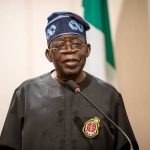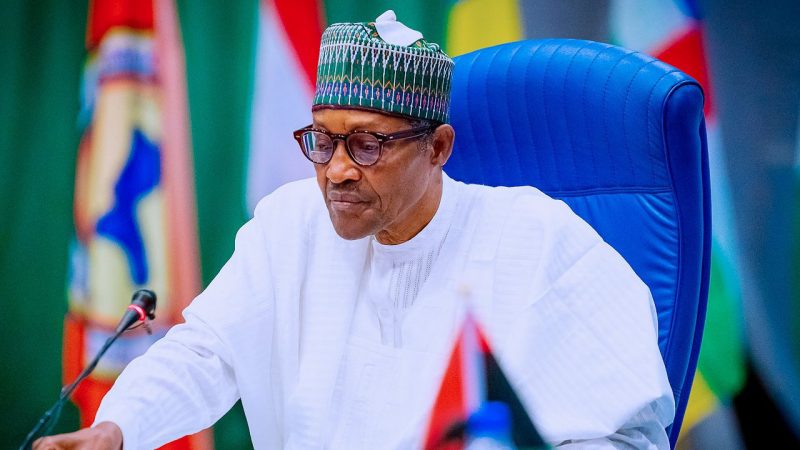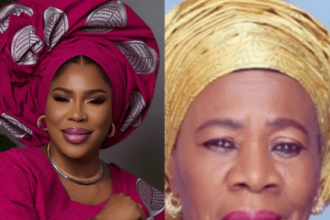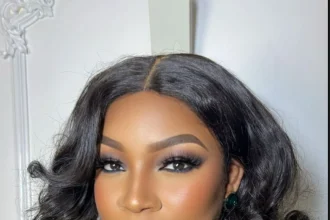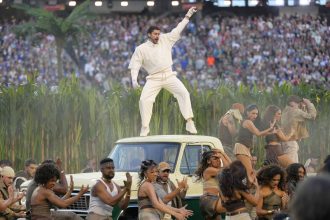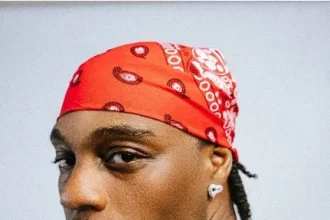In February 2015 in a room full of diplomats, politicians, and business leaders at the Chatham House in London, Maj Gen Muhammadu Buhari (retd) stood tall, about to gain more international goodwill as the 2015 presidential election approached.
Then the presidential candidate of the All Progressives Congress, Buhari told his audience, including a former British High Commissioner to Nigeria (2004-2007), Sir Richard Gozney, that Nigeria was at a defining moment, “a moment that has great implications beyond the democratic project and beyond the borders of my dear country.”
Titling his speech, Prospects for Democratic Consolidation in Africa: Nigeria’s Transition, Buhari spoke to the admiration of world leaders and Nigerians back at home on how with the fall of the Berlin Wall in 1989, the dissolution of the USSR [Union of Soviet Socialist Republics, or simply the Soviet Union] in 1991, the collapse of communism and the end of the Cold War, democracy had become the dominant and most preferred system of government across the globe.
Buhari referred to his 20-month military rulership of Nigeria but said the global triumph of democracy had shown him that another and preferable path to change was possible.
“It is an important lesson I have carried with me since, and a lesson that is not lost on the African continent,” he said to applause.
Before rounding off his speech, Buhari said he had heard and read references to him as a “former dictator” in many British newspapers.
He said, “Let me say without sounding defensive that dictatorship goes with military rule, though some might be less dictatorial than others. I take responsibility for whatever happened under my watch. I cannot change the past. But I can change the present and the future.
“So before you is a former military ruler and a converted democrat who is ready to operate under democratic norms and is subjecting himself to the rigours of democratic elections for the fourth time.”
Some days later after his “inspiring” Chatham House speech, he held an interactive session with the Nigerian Press Organisation in Abuja on March 17, 2015, where he stressed that he had become a converted democrat, restating his commitment to democratic practices.
He said, “I have said elsewhere that I cannot change the past. But I can change the present and the future. Dictatorship goes with military rule. However, I am a former – note the emphasis on the word ‘former – military ruler and now a converted democrat, who is ready to operate under democratic norms.
“I am not only subjecting myself to the rigours of democratic elections for the fourth time, but even after being elected, I will continue to promote the consolidation of democracy in our great country, Nigeria, by guaranteeing that the media’s freedom is not compromised in any way.”
Buhari had previously contested the presidential election three times in 2003, 2007, and 2011 without success. But with his new assurances, many Nigerians believed that, indeed, he had changed from being a military dictator to a democrat. His speeches were convincing enough. His persuasiveness worked. His past was blotted out.
While he was the military head of state, he reportedly waged a draconian ‘war against indiscipline’ – with the aim of forcibly promoting civic virtues. It was in the pre-Internet era when democracy had a less steady foothold in Africa.
Then, Buhari, who oversaw the petroleum ministry in the 1970s, ousted the first democratically elected President Shehu Shagari on New Year’s Eve in 1983 and ruled a military government until August 27, 1985 when he was removed by his surbordinates.
During his military rule, Buhari reportedly significantly derived charismatic authority. He promulgated laws such as the Robbery and Firearms (Special Provisions) Decree for the prosecution of armed robbery cases, and the State Security (Detention of Person) Decree which gave powers to the military to detain individuals suspected of jeopardising state security or causing economic adversity.
Buhari promulgated Decree Number 2 of 1984, whereby the state security and the chief of staff were given the power to detain, without charges, individuals deemed to be a security risk to the state for up to three months. During his regime, strikes and popular demonstrations were banned and the National Security Organisation was entrusted with unprecedented powers.
Using the NSO, Buhari clamped down on public dissent by intimidating, harassing and jailing individuals who broke the interdiction on strikes. In 20 months as the head of state, about 500 politicians, officials and businessmen were reportedly jailed for alleged corruption.
His regime also jailed critics, including music legend Fela Kuti. In 1984, Buhari also passed Decree Number 4, the Protection Against False Accusations Decree, which is considered by scholars as the most repressive press law ever enacted in Nigeria.
Thirty years after his military dictatorship, Buhari emerged again as Nigeria’s fourth democratically elected leader, after presidents Olusegun Obasanjo, Umaru Yar’Adua, and Goodluck Jonathan.
With his return to power, this time round in a democratic dispensation, Nigerians looked forward to having a truly reformed democrat, the kind he told the world he had become in 2015.
However, President Buhari’s actions are perhaps betraying his words going by some of his utterances and decisions ever since he became president.
From his treatment of dissenting voices and protesters to the limiting of the freedom of speech, and pronouncement of laws without first passing bills through the National Assembly, many Nigerians doubt that President Buhari has indeed become a reformed democrat.
A former KOWA presidential candidate, Mr Adesina Fagbenro-Byron, told Sunday PUNCH that up till now, it was clear that the President had yet to fully understand what democracy is all about.
Fagbenro-Byron said, “Apparently, it doesn’t look like President Buhari knew the full implications of what he thought democracy was all about when he made speeches in 2015 that he had become a reformed democrat. I’m not sure he had and has the full understanding of what democracy is.
“In his interview on television on Thursday, he mentioned that it’s easier to fight corruption under the military than under democracy because, under the military, you are guilty until proven otherwise, but that in a democracy, you are innocent until you are proven guilty. I think because he doesn’t fully understand democracy, he is surprised by many events that have happened since he became president.
“He is surprised by people’s response to his actions. I suspect that President Buhari thinks that democracy is a government of the majority, by the majority, and for the majority. He doesn’t think it is a government of the people – which include minority groups – by the people, and for the people.”
Fagbenro-Byron said Buhari’s lack of understanding of democracy might be responsible for him not listening to the minorities or alternative views.
“That was why during his first term, he analysed the percentage in which people voted for him. He never anticipated that in a democracy, there is always a minority. Up till now, he has yet to fully understand what democracy is all about,” he said.
Fagbenro-Byron also cited recent activities such as the Twitter ban, whereby the government technically reduced the people’s freedom of expression.
He said, “Fortunately, Nigeria has a civil society that is growing – take for example the EndSARS protest. It was an exercise on the demand side of democracy. It was a call to improve the police-people relationship. Unfortunately, the government failed there and did not take an advantage of it to deepen democracy.
“Also, look at the Twitter ban. Anything that reduces the strength of public voice and accountability is not in aid of democracy. Democracy is applying the right law when you feel aggrieved. Just as the people can feel aggrieved, the government too can feel aggrieved.”
Meanwhile, apart from the Twitter ban, the Buhari regime had also in the past arrested and detained opposition figures, including activist-cum-journalist Omoyele Sowore, and a former National Security Adviser to former President Jonathan, Sambo Dasuki.
Sowore was arrested in August 2019 for planning a protest, but despite court orders granting him bail, the Department of State Services, which is controlled by the Buhari-led Federal Government, refused to release him.
Sowore was released after much pressure following 125 days in captivity but was rearrested in a Gestapo-style raid on the court where he was standing trial. He was released again in December 2019.
Also, Dasuki was detained by the Buhari regime for four years despite orders by four different high court judges granting him bail, as well as an order by the ECOWAS appellate court that declared his continued incarceration illegal.
The former NSA was alleged to have stolen $2.1bn which was meant for the purchase of arms for the military.
The leader of the Islamic Movement in Nigeria, Ibrahim el-Zakzakky, and his wife, Zeenah, have also spent over four years in detention in violation of court orders granting them bail and ordering their release.
The Buhari regime has also raided the homes of judges and twice deployed armed DSS operatives to foil the arrest of two former security chiefs by the Economic and Financial Crimes Commission.
Also, perhaps for years to come, many will not forget the harassment and intimidation of protesters, particularly the EndSARS protesters. The police reform-seeking protest came to a head on October 20, 2020, when soldiers allegedly shot at the protesters, killing and wounding some of the protesters.
The Buhari regime’s Information and Culture Minister, Lai Mohammed, has also vigorously pushed for anti-hate speech laws to restrict the freedom of expression, particularly on social media.
On June 4, Mohammed announced the indefinite suspension of Twitter, a microblogging and social networking site that has indisputably boosted the freedom of expression of the citizens.
Mohammed, in a statement, said the site’s activities “are capable of undermining Nigeria’s corporate existence.” Twitter’s indefinite suspension came two days after the social media platform deleted a tweet by President Buhari for violating the company’s policies.
Buhari’s tweet referenced the 1967-70 civil war in the country, during which more than one million people reportedly died when secessionists from the South-East region sought to create an independent Biafra nation.
Referring to current secessionists in the South-East region, Buhari threatened to treat “those misbehaving today” in “the language they will understand.”
The tweet generated a huge backlash because of its genocidal tone, causing Twitter to delete it. The Federal Government described Twitter’s action as “insulting.”
However, several notable individuals, groups and world powers including the United States and the United Kingdom have condemned the Twitter ban, while many Nigerians have resorted to the use of virtual private networks to bypass government censorship.
But the Minister of Justice and Attorney General of the Federation, Abubakar Malami, vowed to prosecute the violators of the Twitter ban, a move that is contrary to sections 22 and 39 of the country’s 1999 Constitution (as amended), and Article 19 of the Universal Declaration of Human Rights, which Nigeria is a signatory to.
Speaking with Sunday PUNCH, the National Organising Secretary of Yoruba socio-cultural organisation Afenifere Chief Kole Omololu, said President Buhari’s dictatorial actions were unsurprising, stating that this was why the group didn’t support him during the 2015 presidential election.
Omololu said, “We at Afenifere warned Nigerians because we knew General Buhari’s pasts. Dictatorship is in his blood. There is something we call empirical evidence, and you can use this to judge future actions. Buhari ruled Nigeria in 1984, and he did so draconianly. So when he wanted to return to power in 2015, we warned Nigerians.
“I think his case is that when you don’t fight for something, you won’t cherish it. We at NADECO [National Democratic Coalition] and Afenifere fought for democracy; Buhari never did. He ruled with [General Sani] Abacha. But when we got democracy, he came to us, he said he had become a ‘born again’ democrat, but it was a fallacy. He has run this country in unconstitutional ways. He doesn’t believe in the federal character.
“He talks as if he’s still a military commander. He referred some people to the civil war in 1967-1970, and he said he was going to treat the citizens of his country like that again. Would a democratic leader have said that? No. Whatever Buhari is doing is the opposite of democracy.”
The President, Campaign for Democracy, Mr Bako Usman, also said it was as if Nigeria was still in a military dictatorship.
He said, “This administration has failed long before now. It’s as if we are still in a state of military dictatorship. Obviously, the President makes speeches that are laced with violence; it is sad. When a set of people are agitating, the work of a President is to calm the tension.
“If you look at his speeches in the past, they were about uniting the country, but now his words are polarising the country more and creating divisions. Religious and ethnic polarisations have increased. He is not getting it right again. He is not dancing to the tune of modern society.”
Also, a lawyer and former National Publicity Secretary, Action Democratic Party, Mr Yemi Adetoyinbo, said it was very clear that the nation is more divided than ever before due to ethnic chauvinism, religious bigotry, tribalism, political imbalances, and lopsidedness of appointment in the military and other institutions being promoted by the Buhari regime.
Adetoyinbo asked, “How reformed is the President when he doesn’t adhere to the provisions of the constitution? How reformed is he when he proclaims laws without passing through the National Assembly? He signed Executive Order 10 without passing it through the legislature, and this is what created the recent JUSUN [Judiciary Staff Union of Nigeria] strike.
“Look at the EndSARS protest and Twitter ban. The President has not really shown that he’s a full-blown democrat. Look at the Twitter ban; it’s more a personal thing for the President. If he felt offended by Twitter’s action, he could have gone to court to challenge the social media company; it’s his fundamental human right. The fact remains that actions like the Twitter ban are undemocratic. The President should discard his ego.”
Meanwhile, Adetoyinbo said the National Assembly should do more in checking the actions of the President. “The legislators should know when he’s stepping out of democratic boundaries and put him back in place. Nigeria is the hope of the black people, and we should do more. Buhari has two years to go, he should submit himself to democratic ethos,” he said.


